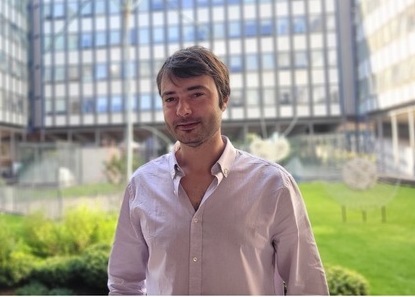David Gueorguiev receives ERC Starting Grant
- 09 October 2023
- Stuttgart
- Haptic Intelligence
The researcher from the Haptic Intelligence Department and from CNRS receives 1.5 million euros from the European Research Council (ERC). He and his team will develop an experimental and computational framework that will open new possibilities for engineers and designers to develop applications that rely on the sense of touch.
Paris, Stuttgart – David Gueorguiev, who is part of the Haptic Intelligence Department at the Max Planck Institute for Intelligent Systems and who is also a permanent researcher at the French National Centre for Scientific Research CNRS, has been awarded an ERC Starting Grant. The 1.5 million euros provided by this grant will go towards the project “Computational Modelling of Tangible Objects on Multisensory Interfaces (TANGO)”. Gueorguiev plans to build a computational model of multisensory interaction to optimize the complexity of haptic stimulation in digital and virtual applications.
“I am very excited to have this great opportunity to pursue my research goals and to be able to take a long-term perspective on the potential outcome of my research”, says Gueorguiev.
ERC Staring Grants are awarded to young scientists and scholars across Europe with a proven track record of excellence. Applicants must demonstrate a high-level of originality in their research ideas and the significance of their research contributions. The prestigious grants provide five years of funding to undertake ground-breaking, high-risk research.
Current interactive systems provide realistic audiovisual feedback. However, haptic feedback is limited, even though haptic interactions with devices are essential and touch plays a large role in conveying immersive sensations. Thus, usable high-fidelity haptic representation has the potential to improve interactions with interfaces and future metaverses. There is a growing amount of knowledge on haptic rendering and multisensory perception of tangible objects. However, combining the different techniques needed to stimulate the full range of tactile sensitivity remains a difficult challenge, and little is known about the hierarchy of tactile cues such as friction, temperature or vibration.
The originality of TANGO is to approach the problem of multisensory representation of tactile objects from a holistic point of view, simultaneously considering multidimensional haptic techniques, tactile acuity in its psychophysical dimensions, and mechanisms of multisensory integration. Specifically, TANGO aims to create a computational model of multisensory integration that outputs perceived realism when interacting with objects. In doing so, TANGO will optimize haptic rendering in multisensory interactive interfaces to enhance their use in human-computer interaction. The project will be hosted at CNRS, and a collaboration with the Haptic Intelligence Department is planned.
After completing his studies in cognitive neuroscience, David Gueorguiev obtained his Ph.D. in tactile perception at the Université Catholique de Louvain in Brussels, Belgium. This experience solidified his research interest in haptics, which refers to how we perceive and interpret tactile sensations. He also developed a research interest in how multisensory perception in our brain combines tactile sensations with information from other senses. Gueorguiev first explored these topics during his post-doctoral studies at INRIA in Lille, France, and at the Max Planck Institute for Intelligent Systems in Stuttgart, where he still works as a part-time researcher. He joined CNRS in 2020 as a researcher in tactile perception and multisensory interaction at the Institute of Intelligent Systems and Robotics (ISIR) in Paris, France. With his team, Gueorguiev uses psychophysical methods to evaluate the ability of haptic devices and multisensory interfaces to reproduce sensory stimuli. They aim to isolate the factors that influence the quality of human perception. Their long-term scientific goal is to establish links between haptics, multisensory perception, human learning and decision making.
ERC Starting Grant



